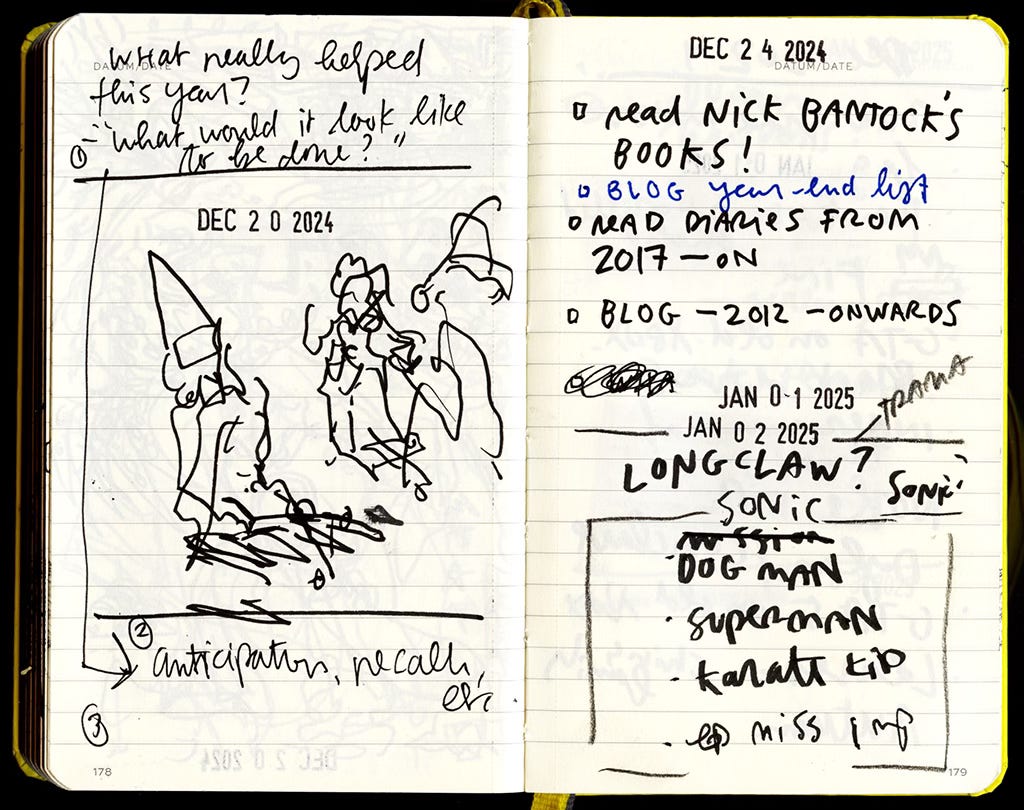My 4 notebooks
And what goes on inside them

Hey y’all,
After I shared a picture of my notebooks in this year-end roundup, I got so many questions about my notebooks and what goes in them that I figured an explanation of them all would make a good letter.
Before I get started, I want to say that this is my system, and I do not necessarily recommend it to others! Writing is my job, so it would make sense that I’d have a bunch of notebooks. My intention with this letter is to be descriptive not prescriptive.
If you’re interested in starting a notebook habit, I encourage you to just buy a notebook or The Steal Like an Artist Journal and write or draw in it every day.
I do not endorse any brands, but if you’d like to try out what I’m currently using here are links to my logbook, pocket notebook, commonplace diary, and diary.
I write in them with all kinds of pens — I’ve got a big list on my gear page.
Okay, let’s start with the notebook I’ve written the least about: my pocket notebook.
I try to have this nearby all the time, whether I’m in the house, in the studio, or out and about in the world. It’s basically just a ”waste book” for scribbling and doodling ideas.
This is the notebook I think about the least, which is also why I think it’s always the most interesting to revisit.
Here’s a random spread from a few weeks ago (thank you, date stamp):
You can see on the left a random blind contour drawing from my kid’s holiday concert and the bones of the “What worked for you this year?” letter. On the top-right is a to-do list and bottom-right is a list of the trailers they played before Sonic The Hedgehog 3 and one-word notes to ask Jules who Longclaw is and look up why trauma plots are such a big thing these days.
One weird thing I’m starting to do is to clip things out of the newspaper and glue them in the pocket notebook. In this way, it functions more like a really messy commonplace book.
Occasionally, I will use the pocket notebook for taking more detailed notes, like this spread I doodled while listening to an interview with Four Tet.
I think all the time about how we emphasize the importance of keeping notebooks and sketchbooks but we almost never talk about the importance of revisiting them and re-reading them. I have found a weekly review hugely helpful: just once a week, sit down and re-read your notebooks and see if there’s anything you can use.
Next up, I’ll show you a spread from the notebook I’ve kept since 2008: my logbook.
My logbook is just a list of what I do every day. I usually keep it throughout the day, but I always make sure over coffee that yesterday is logged before the rest of my morning begins.
The mundanity of this notebook is very important. It is the place to put everything — including the stuff that I’d feel stupid about or bored by recording in my diary:
Here’s what I wrote about the logbook in Steal Like an Artist:
A logbook isn’t necessarily a diary or a journal, it’s just a little book in which you list the things you do every day. What project you worked on, where you went to lunch, what movie you saw. It’s much easier than keeping a detailed diary, and you’d be amazed at how helpful having a daily record like this can be, especially over several years. The small details will help you remember the big details.
In the old days, a logbook was a place for sailors to keep track of how far they’d traveled, and that’s exactly what you’re doing—keeping track of how far your ship has sailed.
I have a terrible memory for things that happen to me, so this is the most valuable notebook I keep. I can’t tell you how weird it is to have a record like this going back seventeen years. For example, I can literally tell you what I did on every single day of my sons’ lives. It’s just bizarre to have this kind of index to your life. (I often use the logbook to look something up, and then consult my diary to see if I wrote more about it.)
For fun, here are two pages from my logbook from 2009, a weekend off from my day job before I’d published any books or had any kids:
Keep reading with a 7-day free trial
Subscribe to Austin Kleon to keep reading this post and get 7 days of free access to the full post archives.







